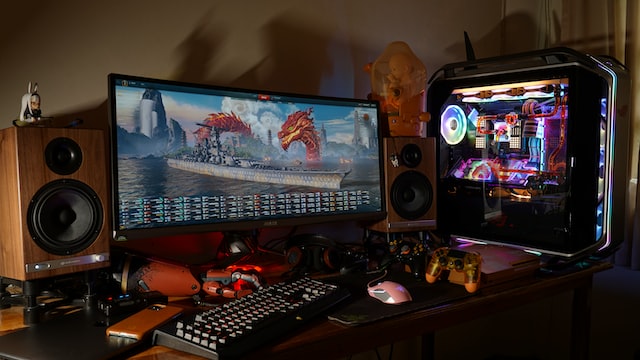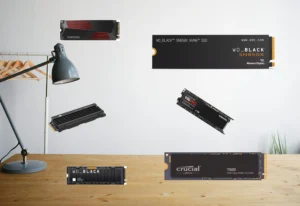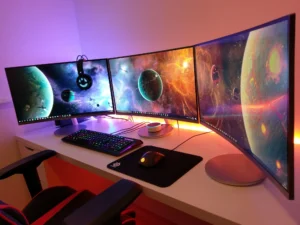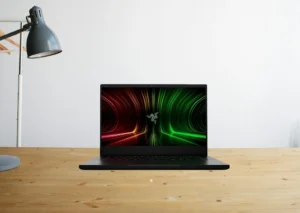Building a gaming PC is an exciting experience, but it can also be intimidating, especially if you’re on a tight budget. As a gamer, you want a PC that can handle the latest games, but you don’t want to break the bank. The good news is that you can build a budget gaming PC that can run most games for under $500.
In this article, we will discuss how to build a budget gaming PC for under $500. We will cover everything you need to know to get started, from the components you need to the assembly process. We will also answer some common questions about budget gaming PCs, such as what a realistic budget is, what components you need, and how much computer you need for gaming.
Building a budget gaming PC is an excellent way to get into PC gaming without spending a fortune. It allows you to customize your PC to your needs and gives you the freedom to upgrade your components over time. Whether you’re a casual gamer or a hardcore enthusiast, building a budget gaming PC is a fun and rewarding experience that will give you years of enjoyment. So let’s get started and build the best budget gaming PC for under $500.
Components Needed for a Budget Gaming PC
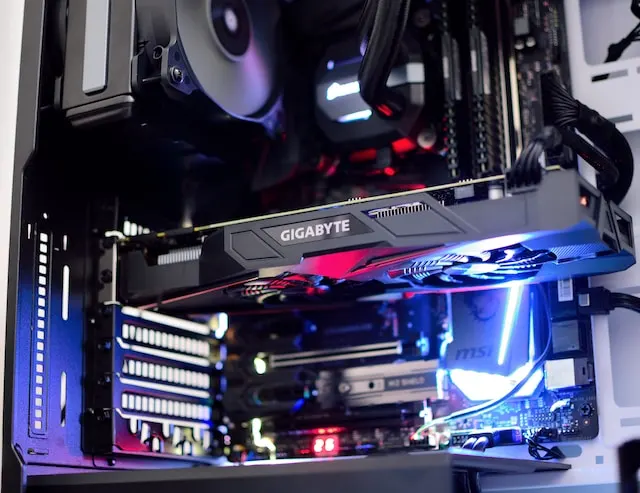
Before you start building your budget gaming PC, you need to make sure you have all the necessary components. Here are the components you will need:
- CPU – The CPU, or Central Processing Unit, is the brain of your PC. It is responsible for executing instructions and performing calculations. A good CPU is essential for gaming, as it can affect your game’s performance.
- Motherboard – The motherboard is the main circuit board that connects all the components of your PC. It also provides power to your components and allows them to communicate with each other.
- RAM – RAM, or Random Access Memory, is used to store data that your CPU needs to access quickly. The more RAM you have, the smoother your gaming experience will be.
- Graphics Card – The graphics card, also known as the GPU, is responsible for rendering graphics and images on your screen. A good GPU is essential for gaming, as it can affect your game’s graphics and performance.
- Power Supply – The power supply unit, or PSU, provides power to all the components in your PC. It is essential to choose a reliable and high-quality PSU to ensure that your PC runs smoothly.
- Storage – You will need storage to store your games, operating system, and other files. You can choose between an HDD or an SSD, with an SSD being the faster and more expensive option.
- Case – The case is where all your components will be housed. It is essential to choose a case that is compatible with your components and provides sufficient airflow to keep your PC cool.
- Optional Components – You may also want to consider additional components such as a CPU cooler, extra fans, or LED lighting to customize your PC.
Now that you know the components you need, let’s take a closer look at each component and how to choose the best options for your budget gaming PC.
Yes, I understand. You would like to write an article with the keyword “budget gaming PC”. Is there anything specific you would like me to help you with in regards to this topic?
Is $500 Good for a Gaming PC?
If you’re a gamer on a budget, you may be wondering if $500 is enough to build a decent gaming PC. The answer is yes – you can build a good gaming PC for $500 or less. Here’s what you can expect from a $500 gaming PC:
A. Explanation of what can be expected from a $500 gaming PC
With a budget of $500, you can expect to build a gaming PC that can play most games at 1080p resolution with medium to high settings. You’ll be able to play games like Fortnite, Apex Legends, and Overwatch with ease, and even newer titles like Cyberpunk 2077 and Assassin’s Creed Valhalla at lower settings.
To achieve this level of performance, you’ll need to carefully choose your components to get the most bang for your buck. You may have to make some compromises, such as choosing a lower-end CPU or GPU, but with some research and planning, you can build a capable gaming PC for $500.
B. Comparison of pre-built vs. custom-built gaming PCs
When it comes to buying a gaming PC, you have two options: pre-built or custom-built. Pre-built gaming PCs are available from major manufacturers like Dell, HP, and ASUS, and are ready to use right out of the box. However, pre-built gaming PCs can be more expensive and may not offer the same level of customization as custom-built PCs.
Custom-built gaming PCs, on the other hand, give you complete control over the components you use, allowing you to choose the best components for your budget. This can result in a more cost-effective and higher-performing gaming PC.
C. Discussion of the benefits of building a budget gaming PC
There are several benefits to building a budget gaming PC. For one, it can be a fun and rewarding experience to build your own PC from scratch. You also have the satisfaction of knowing that you’re getting the best value for your money, since you can choose the components that offer the most performance for your budget.
Building your own PC also gives you the ability to upgrade or replace components in the future, which can save you money in the long run. Plus, you’ll have the knowledge and skills to troubleshoot and repair your PC if something goes wrong.
Overall, building a budget gaming PC for $500 or less is a great way to get into PC gaming without breaking the bank. With some careful planning and smart component choices, you can build a capable gaming PC that will provide hours of entertainment.
Best Gaming PCs Under $500
If you’re on a tight budget but still want to enjoy some gaming, there are several pre-built options available for under $500. Here are some of the best gaming PCs in this price range:
- Dell OptiPlex 7010 – This desktop computer comes with an Intel Quad-Core i5 processor, 8GB DDR3 RAM, and a 240GB SSD. It also has a built-in Wi-Fi adapter and comes with a keyboard and mouse.
- HP Elite 8300 – Another great option is the HP Elite 8300, which features an Intel Quad-Core i5 processor, 8GB DDR3 RAM, and a 500GB HDD. It also has a built-in Wi-Fi adapter and comes with a keyboard and mouse.
- Lenovo ThinkCentre M93P – The Lenovo ThinkCentre M93P is a compact desktop computer with an Intel Core i5-4570T processor, 8GB DDR3 RAM, and a 128GB SSD. It also has a built-in Wi-Fi adapter and comes with a keyboard and mouse.
- HP Pavilion Desktop – This desktop computer comes with an AMD Ryzen 3 3200G processor, 8GB DDR4 RAM, and a 256GB SSD. It also has built-in Wi-Fi and Bluetooth adapters and comes with a keyboard and mouse.
- Acer Aspire TC-885-UA92 – The Acer Aspire TC-885-UA92 features an Intel Core i5-9400 processor, 8GB DDR4 RAM, and a 512GB SSD. It also has built-in Wi-Fi and Bluetooth adapters and comes with a keyboard and mouse.
When comparing these gaming PCs, it’s important to consider your specific needs. If you want a faster processing speed, the Acer Aspire TC-885-UA92 is a great option. If you’re looking for a compact PC, the Lenovo ThinkCentre M93P is a good choice. Ultimately, the best gaming PC for you will depend on your personal preferences and gaming requirements.
Realistic Budget for a Gaming PC
When it comes to building a gaming PC, determining a realistic budget can be a challenge. While it’s tempting to aim for the most powerful components available, it’s important to keep in mind that cost can quickly add up. Here are some factors to consider when determining a realistic budget for a gaming PC:
A. Factors to consider when determining a realistic budget for a gaming PC:
- Desired performance level: The more demanding the games you plan to play, the more powerful components you will need, which will increase the cost.
- Future upgrades: If you plan to upgrade your PC in the future, it may be worth investing in higher-end components now to save money in the long run.
- Cost of peripherals: Don’t forget to factor in the cost of a monitor, keyboard, mouse, and other peripherals when determining your budget.
B. Components that have the biggest impact on cost:
- CPU: The processor is one of the most important components in a gaming PC and can have a significant impact on cost.
- Graphics card: A powerful graphics card is essential for gaming, but can also be one of the most expensive components.
- Storage: Solid-state drives (SSDs) are faster than traditional hard drives but can be more expensive.
C. Balancing cost and performance: To build a gaming PC on a budget, it’s important to prioritize the components that have the biggest impact on performance. Consider opting for a mid-range CPU and graphics card and investing in more storage later on. It’s also important to shop around and compare prices to find the best deals on components. Finally, consider building your PC over time, purchasing components as your budget allows, rather than buying everything at once.
Building Your Budget Gaming PC
Once you have all the components for your budget gaming PC, it’s time to start building. Here are the steps you need to follow to build your own budget gaming PC:
- Prepare your workspace – Clear a large, clean workspace with good lighting. Make sure you have all the necessary tools, including a screwdriver, pliers, and cable ties.
- Install the power supply – Install the power supply in the bottom of the case and connect the cables to the motherboard and other components.
- Install the motherboard – Install the motherboard in the case and connect the power cables, data cables, and front panel connectors.
- Install the CPU and RAM – Install the CPU in the motherboard’s CPU socket and secure it with the CPU cooler. Install the RAM in the motherboard’s RAM slots.
- Install the graphics card – Install the graphics card in the PCIe slot and connect the power cables.
- Install the storage – Install the storage device (SSD or HDD) in the case and connect the data and power cables.
- Connect the case fans – Install the case fans and connect them to the motherboard or power supply.
- Close the case – Close the case and secure it with screws.
- Connect peripherals – Connect the keyboard, mouse, and monitor to the PC.
- Turn on the PC – Turn on the PC and make sure it boots up properly. Install the operating system and drivers as needed.
Building your own budget gaming PC can be a fun and rewarding experience. Make sure to take your time and follow the instructions carefully to avoid any mistakes. Once your PC is up and running, you can enjoy the latest games without breaking the bank.
Conclusion
In conclusion, building a budget gaming PC is an excellent way to enjoy gaming without breaking the bank. By following the advice provided in this article, you can build a high-performance gaming PC for under $500.
A. Recap of the article’s main points:
- A budget gaming PC can provide excellent performance for a fraction of the cost of high-end gaming PCs.
- Custom-built PCs offer better performance and value compared to pre-built PCs.
- The best gaming PCs under $500 offer a range of features and specifications to suit different needs.
- A realistic budget for a gaming PC depends on factors such as desired performance level, future upgrades, and peripheral costs.
- Prioritizing key components and shopping around for the best deals can help balance cost and performance.
B. Final advice for building a budget gaming PC:
- Do your research and make informed decisions when selecting components for your PC.
- Consider building your PC over time, rather than all at once, to spread out the cost.
- Don’t be afraid to experiment and make changes to your PC as your needs and budget change.
C. Encouragement to start building and gaming on a budget: Building a budget gaming PC is a fun and rewarding experience that can provide you with years of gaming enjoyment. With the right components and a bit of creativity, you can build a powerful gaming PC that will provide excellent performance without breaking the bank. So, don’t hesitate to start building and enjoy gaming on a budget!
